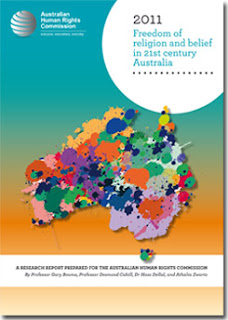
The Australian Human Rights Commission has just published a report that has been about 4 years in the making. Entitled "Freedom of religion and belief in 21st century Australia", this report seeks to respond to the aims of a National Action Plan to "build social cohesion with a particular focus on fostering connections and understanding between Muslims and non-Muslims."
There is a lot of interesting material in the report and its findings were not all positive. Religious life in Australia has become complex as new, non-Christian religious communities have grown in number and size. But perhaps the most interesting shift for me is the place of the non-religious and their claims about the nature of Australia as a secular nation.
In discussing the nature of the secular, the researchers received submissions from people who
claimed the right to unbelief and the right to be free from religion. They argued that the term "freedom of religion and belief" excludes the rights of persons who hold beliefs that are not religious, or who believe there is a right to non-belief.
I was intrigued by the distinction that was trying to be made here. To say we have "freedom of religion" is to say we can have any religion we like, but it is also to imply or assume that we all have a religion. They thus argue that we should speak about Freedom From Religion.
I can see the linguistic sense of this argument, but having spent a recent weekend debating matters of faith with members of the Atheists Federation of Australian Forums they seem to me to want to assert the right to take God and religion completely out of public spaces, consigning God and religion to an entirely private sphere.
From a Human Rights perspective, while they might claim that the presence of the religious in any form in the public arena is an infringement of their right to live in complete freedom from religion, the corollary of this position is that to grant the position would be to deny the rights of the religious to live in a public arena that recognises the place of religion. So, whose rights will win the day?
The report chose to avoid dealing with this issue, but it is one that lies at the heart of the current debate about the place of Christian Chaplain in public schools.
Having listened to the stories on the Atheists Federation forums about the intrusion of the religious factor in their schools in the persons of rather evangelical Christian chaplains, I have some significant sympathy for them. Where I work, the emphasis is on service, compassion and respect rather than evangelism in the delivery of school chaplaincy services in public schools and the kinds of embarrassing situations described concerning Chaplains in Queensland are much less likely to occur in this state.
However, I find the demand to make all public institutions "religion-free" is more an attempt to marginalise the religious than to make a valid claim for a human right.
Another little issue the Atheists raised, which again I have some sympathy for, was the wording of the religious question in the Census. Rather than having atheism, agnosticism or no-religion as options among a long list of religions, they suggest that the section should begin with the simple question "Do you have a religion?" If you answered YES, you would then be invited to respond to the next question about what sort of religion you adhere to. If you answered NO you would be invited to skip the next question. It would be interesting to trial both approaches to see if the Census reports of religiosity would be affected by such a change.
Finally, it is my view that social cohesion is best promoted by an understanding of the idea of "freedom of religion" that embraces the freedom to have no religion as an option. Those of us who are religious have just as much responsibility, perhaps more, to be respectful and tolerant of those who choose a non-religious life-style, as we would expect avowed atheists to be respectful of our choice to be religious. This also requires a willingness to allow each other to enter the public discourse in ways that are shaped by our faith or non-faith.
What do you think?